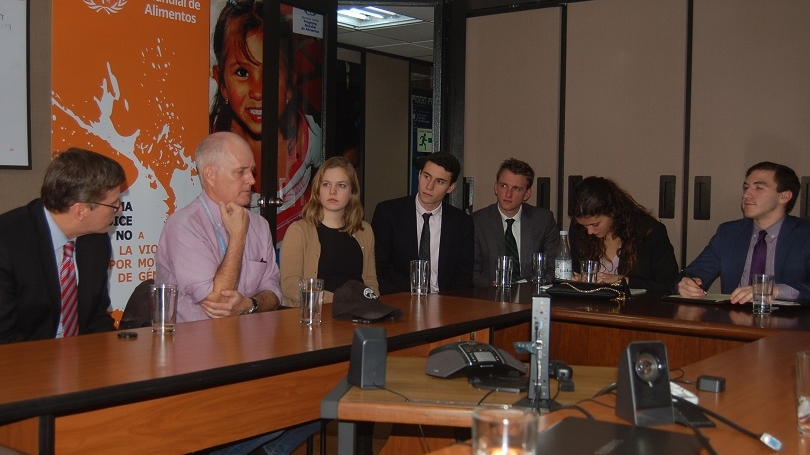
Menu
- Public Policy
- Leadership
- Funding
- News & Events
- About the Center
Back to Top Nav
Back to Top Nav
Back to Top Nav
Back to Top Nav
The PBPL class started the day talking with Doug Mercado of the UN World Food Program (WFP). Mercado is currently based in Bogota, Colombia, and he works as the WFP’s Emergency Response Coordinator and coordinates the organizations food programs for Venezuelan migrants on the western border, but has worked on humanitarian aid before in Angola, Eritrea, and Bosnia among many others. The class had a lively discussion with Mercado on topics like how the new Duque administration is addressing the influx of migrants across the border, how the migrant crisis could affect the implementation of the peace agreement, and the possibilities for using food grown by ex-combatants to feed migrants. Mercado, who knows Spanish, Portuguese and some Serbo-Croatian along with English, emphasized to the class the amazing opportunities learning foreign languages has for opening up new environments and cultures and the many opportunities to work in humanitarian aid around the globe.
For lunch the class met with Silvia Delgado, a current analyst at Blumont, a U.S. based relief and development NGO currently working in Colombian communities affected by the conflict. Before Blumont, Delgado worked in the Colombian government on the land restitution law in 2011, the negotiations of the peace deal with the FARC, and transitional justice mechanisms for crimes committed by the various actors in the conflict. The discussion focused on the nature of the transitional justice mechanism in Colombia, what steps the government has taken to implement the various mechanisms so far, and critical considerations on how other organizations, like the ICC, are watching how the government tries members of the military.
After the lunch discussion, the class joined Delgado in watching a new documentary film “La Negociación” about the Colombian peace process with the FARC. After a week in Bogota, the class has spoken to many intellectuals, journalists, policy makers in Colombia and has gotten a feeling for the complexity of the peace process in Colombia: the difficulties of rural land reform in a country with an entrenched land-owning social oligarchy and a conservative national identity, the complexities of using a state transitional justice mechanism to investigate crimes committed by the state’s own military, and the frustration of thinking about trying to replace the illicit drug economy in Colombia when so little is being done to reduce the demand for drugs in the U.S.
Afterwards, the class got together to debrief on the lessons learned from Bogota. Up next - visits to two ECTR camps, FARC reintegration camps, near Valledupar.
Written by Michael Everett '19, 18F PBPL 85: Global Policy Leadership course participant
This is part of a series where PBPL 85:Global Policy Leadership students reflect on their experiences during the two-week field research portion of course. While in country, students meet with local policy leaders: politicians, academics, civil society leaders, journalists, business leaders, diplomats, and other in-country experts who help inform their analyses.